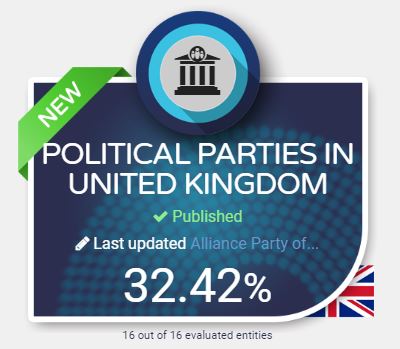UK Political Parties Suspend In Transparency

Even the 1st in the ranking doesn’t pass the 50% mark
Málaga, Spain:
The ongoing citizen-driven transparency evaluation platform Dyntra.org launched on May 11th the transparency index of the main 16 UK Political Parties, and the real-time results dated today, June 1st, 2017, unveils that every single political party still has a pending subject in relation to their own transparency, with an average score of only 32,42%. The 1st in the ranking are the Liberal Democrats with 48% followed by the Green Party of England and Wales with 41,33% and in a tied 3rd place, with 40% the UK Independent Party and Labour Party.
“Many studies show that people have a low level of trust in government and politicians, and it is up to them to start gaining the trust back of the people. The 1st step in this process is becoming transparent, and that is Dyntra’s goal, allowing the citizens to measure the transparency of their government entities, like the political parties, and so push them to start working on becoming more transparent.” said Dyntra’s International Relations Director & Co-founder Erwin de Grave. “It is a topic that concerns several political parties as shows the active participation of Plaid Cymru’s CEO Gareth Clubb in the evaluation of their own party.”
Here are some key figures:
• The index is composed of 75 indicators organised in 4 main categories: Institutional Transparency, Access to Information, Financial Transparency, and Recruitment.
• The UK Political Parties score best in the category of Access to Information with an average of 48,30%, where Labour Party has the best score with 72,73%.
• The averages in the other categories are: Financial Transparency with 40,91%, Institutional Transparency with 17,36% and Recruitment with 0%.
About Dyntra: Dyntra.org is the 1st global citizen-driven platform that measures in real-time and ongoing the transparency of organisations and their elected representatives. Currently on Dyntra more than 800 evaluators have evaluated or are evaluating over 3.200 organisations in 201 countries, including Municipalities, Political Parties, Ombudsmen, Court of Auditors, Universities, Regional governments, World Cities. Future planned indexes: MEPs, International Organisations, Public Organisations.
Événement précédent
